|
De Britse dichteres van humoristische poëzie Pam Ayres werd geboren op 14 maart 1947 in Stanford in the Vale in Berkshire (tegenwoordig Oxfordshire). Zie ook alle tags voor Pam Ayres op dit blog.
Sat Nav
I have a little Satnav, It sits there in my car
A Satnav is a driver's friend, it tells you where you are.
I have a little Satnav, I've had it all my life
It's better than the normal ones, my Satnav is called a wife.
It gives me full instructions, especially how to drive
"It's sixty miles an hour", it says, "You're doing sixty five".
It tells me when to stop and start, and when to use the brake
And tells me that it's never ever, safe to overtake.
It tells me when a light is red, and when it goes to green
It seems to know instinctively, just when to intervene.
It lists the vehicles just in front, and all those to the rear
And taking this into account, it specifies my gear.
I'm sure no other driver, has so helpful a device
For when we leave and lock the car, it still gives its advice.
It fills me up with counselling, each journey's pretty fraught
So why don't I exchange it, and get a quieter sort?
Ah well, you see, it cleans the house, makes sure I'm properly fed
It washes all my shirts and things, and keeps me warm in bed!
Despite all these advantages, and my tendency to scoff,
I only wish that now and then, I could turn the bugger off.
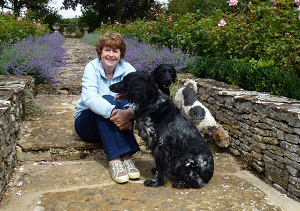
Pam Ayres (Stanford in the Vale, 14 maart 1947)
De Duitse schrijver Jochen Schimmang werd geboren op 14 maart 1948 in Leer, Ostfriesland. Zie ook alle tags voor Jochen Schimmang op dit blog.
Uit: Grenzen Ränder Niemandsländer
„Als wir durch den Stellenwechsel meines Vaters umzogen‚ kam ich erstmals in die Nähe einer richtigen Grenze, das heißt, einer Grenze zum Ausland. So toll gesichert wie die zur Ostzone war sie allerdings nicht und daher beim ersten Anblick fur mich etwas enttäuschend. Es gab einen Schlagbaum, und man musste selbstverständlich seinen Personalausweis vorzeigen. Aber an so etwas wie Selbstschussanlagen, Wachtürme oder scharfe Munition dachte man nicht, wenn man den deutsch-holländischen Grenzübergang Neuschanz (damals traute sich noch kein Deutscher, den Namen Nieuwe Schans auzusprechen) passierte. Was doch häufiger geschah, damals, weil es in Neuschanz/Nieuwe Schans im Laden direkt an der Grenze Kaffee, Butter und andere Lebens- und Genussmittel billiger einzukaufen gab als auf deutschem Boden. Der Ort selbst interessierte eigentlich nicht. Entscheidend war die Grenze: der Unterschied: der Preis.
Auf diesen Expeditionen war ich damals immer in Begleitung meiner Eltern bzw. meines älteren Brudes. Mein erster Grenzübertritt ohne diese ohne diese Begleitung scheiterte. lch war mit einem Schulfreund bis an die Grenze getrampt. Der Fahrer des Wagens. der uns mitgenommen hatte, blieb aber auf der deutschen Seite (weil er dort wohnte), und wir mussten zu Fuß auf die andere Seite wechseln.
Zumindest versuchten wir es. Wir waren l3 oder 14, es war ein Werktag, und wir hatten dennoch schulfrei.
Der Werktag war der 31. Oktober, in protestantischen Gebieten Deutschlands auch unter dem Namen Reformationstag bekannt („Ein feste Burg ist unser Gott“) und damals in eben diesen Gebieten noch ein Feiertag.
Das Wetter war schon im November angekommen. Die Deutschen ließen uns durch, aber an der wirklichen Grenze: am Schlagbaum: am Häuschen pflanzte sich ein ziemlich langer Holländer in einem fast ebenso langen schwarzen Unifonnmantel und mit einer sdnwarzen Schirmmütze vor uns auf und fragte: -Warum seid ihr von zu Hause weggelaufen?“
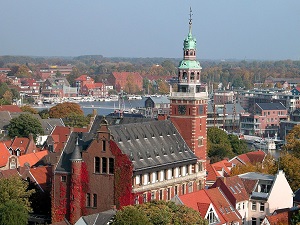
Jochen Schimmang (Leer, 14 maart 1948)
Leer
De Duitse dichter Volker von Törne werd geboren op 14 maart 1934 in Quedlinburg. Zie ook alle tags voor Volker von Törne op dit blog.
Deutsche Heraldik
1
Noch trage ich kein Brett vorm Kopf
Und fiel in keinen Honigtopf
Doch hab ich mir das Maul verbrannt
Schon oft im deutschen Vaterland
2
Was fragt ihr mich, wies weitergeht
Ich sage euch: es ist zu spät
Ich sehe schwarz, und den Befund
Les ich euch aus dem Kaffeegrund
3
Die Zähne habt ihr ausgespuckt
Und euch vor jeder Maus geduckt
Jetzt zittert ihr in eurem Haus
Vor jeder Wanze, jeder Laus
4
Was ihr berührt, das wird zu Müll
Was auch geschieht, ihr haltet still
Ihr tragt in eurem Wappenschild
Der Eintagsfliege goldnes Bild
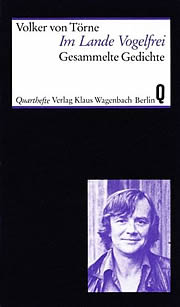
Volker von Törne (14 maart 1934 – 30 december 1980)
Cover
De Amerikaanse schrijver en draaiboekauteur Horton Foote werd geboren op 14 maart 1916 in Wharton, Texas. Zie ook alle tags voor Horton Foote op dit blog.
Uit: The Old Beginning
"TOMMY. Are you sure this is the right file cabinet? (MR. Mavis is busy looking at papers on his desk and doesn’t answer.) Dad, where is it? I can’t see it?
MAVIS. Now where would it be, Son? Think carefully. Think.
TOMMY. It should be under N, but it isn’t.
MAVIS. Then look again. It’s bound to be under N.
ROBERTA. Oh, H.T., stop teasing the boy and help him to find it. I’m in a hurry.
MAVIS. He’s twenty-four, Roberta. I’m leaving him in charge of my business. It’s time he learned to think things through for himself. Have you found it, Tommy?
(Tommy looks through the files)
TOMMY. I tell you it’s not here.
MAVIS. Then you have the wrong file cabinet.
TOMMY. OK. But you said …
MAVIS. Never argue with your father in front of customers. Son, just look in the other one.
TOMMY. All right. (He starts for the next one)
MAVIS. You must have had the wrong file cabinet.
TOMMY. I didn’t have the wrong one. You told me to look there.
MAVIS. Quickly, Son, never keep a customer waiting.
(Tommy gives him a look and goes to the other cabinet)
ROBERTA. Help him, H.T. We have so much to do this afternoon.
MAVIS. Now, Roberta. Let me handle this. Tommy is twenty-four. He has to learn about things. By the time I was twenty-four, Mrs. Nelson, I had saved twenty thousand dollars.
ROBERTA. Tommy is twenty-three, H.T. He is not twenty-four.
MAVIS. Well, do you think he’s going to save twenty thousand dollars in the next year?”
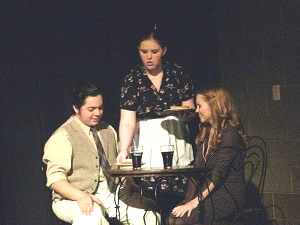
Horton Foote (14 maart 1916 – 4 maart 2009)
Scene uit een opvoering in Dallas, 2011
De Franse schrijver Olivier Delorme werd geboren op 14 maart 1958 in Chalon-sur-Saône. Zie ook alle tags voor Olivier Delorme op dit blog.
Uit: Yannis Tsarouchis, ou l’Éros en maillot de corps
« Quant à la tradition orientale, Tsarouchis se familiarise avec elle dès ses années d’étude, avant son premier voyage à Paris. En 1930, il devient pour trois ans l’assistant de Photis Kontoglou, un réfugié d’Asie Mineure qui prône le retour à la peinture byzantine, icône et fresque, pour créer une peinture profane et moderne authentiquement grecque. Tsarouchis apprend alors le tissage traditionnel, mais aussi à psalmodier ; il étudie les tissus coptes auxquels Matisse s’est également intéressé, il copie ses premiers portraits funéraires du Fayoum au musée ethnographique d’Athènes. Il ne cessera toute sa vie d’y revenir, en copiant d’autres au Louvre ou au musée de Dijon – en 1976 encore.
Ainsi, lorsque, en 1935, il peint une série de jeunes hommes déguisés en evzones, il donne à l’un d’entre eux le visage d’un Fayoum qu’il se souvient avoir vu au Louvre… et qu’il ne retrouvera jamais. Quant à ses portraits (1971) de F.P. et d’un « coiffeur anglais », tous deux couronnés d’or, ils sont directement inspirés du saisissant « expressionnisme oriental » de cet art grec de l’Égypte hellénistique (Ier-IVe siècles de notre ère). Mais au-delà, cette source irrigue tout l’art du portrait de Tsarouchis, exactement à la manière dont les épitaphes hellénistiques inspirent à Cavafis quelques-uns de ses plus beaux poèmes.
La rencontre avec la peinture de Pompéi, au retour du voyage parisien de 1935, puis avec la mosaïque de la Méduse hellénistique dite du Pirée seront tout aussi déterminantes : incapable d’achever le premier des nus masculins d’après nature qu’il a entrepris, Tsarouchis raconte qu’il s’est rendu au Musée national d’Athènes pour y copier la Méduse."
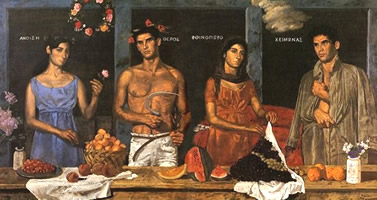
Olivier Delorme (Chalon-sur-Saône, 14 maart 1958)
De vier jaargetijden door Yannis Tsarouchis, 1965
De Franse schrijver, tekenaar, schilder, karikaturist en journalist Albert Robida werd geboren op 14 maart 1848 in Compiègne.Zie ook alle tags voor Albert Robida op dit blog.
Uit: The Monkey King (Fragment uit:Voyages très extraordinaires de Saturnin Farandoul,vertaald door Brian Stableford)
« The infant's name is Fortuné-Gracieux-Saturnin Farandoul. The names of the parents and witnesses are irrelevant to our story, so we shall pass over them in silence, but we must state that this document had further implications: firstly, that Saturnin Farandoul was a French citizen; and secondly, that he was only four months and seven days old. Truly, this was an early start for a career as a castaway.
After mature reflection, Papa Orang-utan evidently came to a decision in the matter of the newly-discovered infant; he made a gesture signifying that five might just as well be six, and got up. The child was adopted; the family, thus augmented, ambled back along the path to their abode.
It was a good night for all concerned. The moon illuminated the tranquil sleep of our hero in the bosom of his adopted family, in the deep forest. The sun rose to find Farandoul perfectly comfortable in his new social estate, and his adoptive parents quite content with their lucky find.
In her hut of branches covered with large banana leaves, the good she-monkey studied her nursling while he feasted greedily upon the banquet offered to his lips by beneficent Nature. In addition to the little monkeys, fascinated by the appearance of this new companion, there was a large crowd in the hut, dominated by she-monkeys.
What astonishment there was on every face! With what curiosity were the least movements of little Farandoul followed! At first, the young she-monkeys could not suppress a thrill of fear when the nursing mother jokingly extended the infant towards them, but soon the gentleness of Farandoul won every one of their hearts, and the entire audience was soon competing for the privilege of loving him up. The hut never emptied; male and female monkeys came from the neighbouring forests carrying gifts of fruit and coconuts, which Farandoul pushed away with his hands and feet in order to thrust himself back upon the quasi-maternal breast.
Outside, Farandoul's foster-father, surrounded by old white-bearded orangs, seemed to be telling the story of his discovery. Perhaps he was giving his report to the authorities; in any case, he saw by their benevolent gestures that the elders approved of his conduct and appeared well pleased with him.”
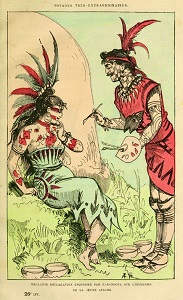
Albert Robida (14 maart 1848 – 11 oktober 1926)
Illustratie uit “Voyages très-extraordinaires de Saturnin Farandoul »
De Roemeense dichter Alexandru Macedonski werd geboren op 14 maart 1854 in Craiova. Zie ook alle tags voor Alexandru Macedonski op dit blog.
Nuit de Décembre (Fragment)
Elle est tout aussi grande en lui et sur terre,
Froide, la lune en lui et dans le ciel…
Les ténèbres lui allongent terribles coups de serre.
Son front, les ombres le réclament, démentielles…
Froide, la lune en lui et dans le ciel.
Tout à coup, le feu couvant sous les cendres pétille…
Sur les murs, des visions bleuîtres s'emportent…
Dans la cheminée, une vive flamme éclate et brille,
S'élance, palpite, crépite et, cependant, babille.
Dis donc, Archange d'or, qu'est-ce que tu nous apportes ?
Et la flamme prend sur elle pour dire : « Je vous inspire…
Ecoute et chante toi-même et tîche jeune encore d'être…
Dans la gloire du retour, étouffe tes soupirs…
En fort et riche émir, tu dois apparaître ».
Et la flamme prend sur elle pour dire : je vous inspire
Et, dans la blanche pièce, tout se met à frémir.
La tristesse émanée des congères disparaît…
Tout est en or : l'horizon jusqu'à l'orée, -
C'est lui, l'émir d'une ville extraordinaire…
Ses palais sont de blancs fantasmes, en entier,
Cachés par feuilles, fruits surgis des contes de fée,
Se mirant dans l'éclat d'une claire rivière.
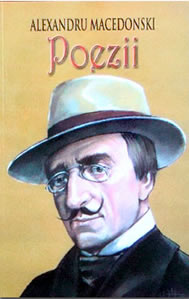
Alexandru Macedonski (14 maart 1854 – 24 november 1920)
Cover
De Franse dichter Theodore Faullain de Banville werd geboren op 14 maart 1823 in Moulins in de Auvergne. Zie ook alle tags voor Theodore de Banville op dit blog.
Le printemps
Te voilà, rire du Printemps !
Les thyrses des lilas fleurissent.
Les amantes qui te chérissent
Délivrent leurs cheveux flottants.
Sous les rayons d'or éclatants
Les anciens lierres se flétrissent.
Te voilà, rire du Printemps !
Les thyrses de lilas fleurissent.
Couchons-nous au bord des étangs,
Que nos maux amers se guérissent !
Mille espoirs fabuleux nourrissent
Nos coeurs gonflés et palpitants.
Te voilà, rire du Printemps !
L'Automne
Sois le bienvenu, rouge Automne,
Accours dans ton riche appareil,
Embrase le coteau vermeil
Que la vigne pare et festonne.
Père, tu rempliras la tonne
Qui nous verse le doux sommeil ;
Sois le bienvenu, rouge Automne,
Accours dans ton riche appareil.
Déjà la Nymphe qui s'étonne,
Blanche de la nuque à l'orteil,
Rit aux chants ivres de soleil
Que le gai vendangeur entonne.
Sois le bienvenu, rouge Automne.
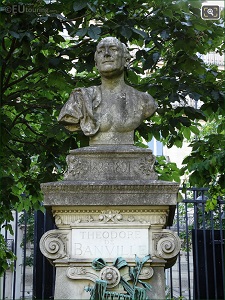
Theodore de Banville (14 maart 1823 – 15 maart 1891)
Borstbeeld in Le Jardin du Luxembourg, Parijs
Onafhankelijk van geboortedata
De Nederlandse dichter Wout Waanders werd geboren in 1989in ’s-Hertogenbosch. Zie ook alle tags voor Wout Waanders op dit blog.
Wal
Toegegeven, ik ben een muur,
Van wantsen als verlegen nimfen
Hoe langer je naar me kijkt
Hoe breder ik kan worden
Er is om mij heen te lopen,
Maar voor je het weet,
Kom ik op je af;
Pantsers in je kielzog
Ik kruis straten, gordels
patrijzen, palen, perken door,
Dwars tussen het dressoir
Van spuitend ongenoegen
Geen houden meer aan mij,
Alleen eventjes te leunen
Aan de enige binding
- of onderbreking -
Van alles wat niet tot jou valt
en ergens beklijft

Wout Waanders (’s-Hertogenbosch, 1989)
Zie voor nog meer schrijvers van de 14e maart ook mijn blog van 14 maart 2015 en ook 14 maart 2015 deel 2.
|



